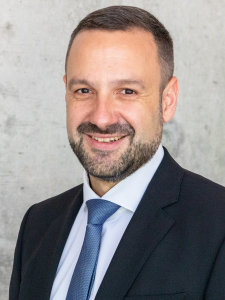In conversation with Dr. Randy Rydell - Foundation Office New York
Erica Mumford, KAS New York: Why are global non-proliferation and disarmament norms important today, especially in light of the current geopolitical context?
Dr. Randy Rydell: Norms – both legal and political – are indispensable in establishing and maintaining expectations of the behavior of sovereign states in a largely anarchic international society. Non-compliance with fundamental norms of international relations, frequent though it may be, does not disprove either the existence of norms or the value of maintaining them. This is also true in domestic society: we don’t point to acts like driving through red traffic lights, committing murder, or any other egregious felonies as justifying the repeal of laws or norms to prohibit such activities. Disarmament and non-proliferation norms are no exception, and, in many ways, they are more relevant and important than ever, especially in these fields. This is because of the horrific, catastrophic human and environmental effects of using weapons of mass destruction – nuclear in particular – and the wider social and economic opportunity costs of expending vast resources in the development, maintenance, and deployment of such weapons. Norms alone cannot be expected to eliminate rivalries between these sovereign states, but they play a crucial role in modulating that competition and channeling it into directions that serve mutual interests. The greatest dangers ahead in these fields are the gradual erosion of the fundamental taboo or norm against the use of nuclear weapons, and the continued failure of states possessing such weapons to enter into good-faith negotiations on nuclear disarmament – developments that jeopardize the future of both disarmament and non-proliferation, and indeed, the future of our fragile planet and civilization itself. This is precisely why disarmament and non-proliferation norms are important today.
Erica Mumford: What do you see as the biggest challenges for the United Nations in reinvigorating the WMD/nuclear non-proliferation regime?
Dr. Randy Rydell: In a speech on 13 May 1954 in California, UN Secretary-General Dag Hammarskjöld concluded, “It has been said that the United Nations was not created to bring us to heaven, but to save us from hell.” The twin goals of disarmament and reductions of military spending have been pursued at the UN since its origin, certainly, since the General Assembly’s first resolution called in 1946 for the elimination of nuclear and other “weapons adaptable to mass destruction”. Since then, these goals have become part of the identity of the UN as an international organization. In the decades that followed a complex “regime” of multilateral treaties, bilateral arms control agreements, regional initiatives, and various unilateral or plurilateral commitments has evolved that aims both at the elimination of nuclear weapons and the achievement of “general and complete disarmament”, which combines WMD disarmament with conventional arms control, limits on military spending, and implementation of the primary UN Charter norms on the peaceful settlement of disputes and the prohibition of threats or use of force. In the disarmament and non-proliferation fields, the UN has served as a kind of “assembly line” for the establishment, elaboration, updating, and implementation of multilateral norms in these fields. Yet as an inter-governmental organization, the UN can only be as successful as its member states wish it to be – it is convenient (some might say indispensable) means available to states to pursue their common interests, should they choose to do so, a contingency often termed “political will”. The biggest challenge for the UN relates to decisions by member states to use the organization simply as a tool to pursue exclusively only their own perceived, narrow national interests, rather than the common good. Though this applies to all the UN’s work, the failure of this overarching “regime” would most surely lead us all to Hammarskjöld’s hell. If this happens, the responsibility won’t lie with the UN but with the policies, practices, actions, and inactions of its member states.
Erica Mumford: How might the reform of the global disarmament machinery complement wider global governance reform initiatives, including UN Security Council reform and the proposals outlined in the Secretary-General’s New Agenda for Peace?
Dr. Randy Rydell: Hammarskjöld often referred to disarmament as the UN’s “hardy perennial”, and a half-century later, it remains so. Yet another such hardy perennial is the never-ending process of reforming, re-organizing, and tinkering with the administrative apparatus of the UN, often in the familiar names of “efficiency and effectiveness”, or at times, fairness, and justice. Reforms in the disarmament machinery have dealt both with procedural matters and attempts to adjust substantive priorities. The UN Disarmament Commission has sought for several decades to deliberate principles, guidelines, and recommendations typically in two substantive areas, with one dealing with nuclear weapons. While reforms have limited the number of issues for deliberation, its productivity has been limited by the lack of consensus among its members, which includes all UN member states. The General Assembly continues to adopt fifty or so resolutions each year on disarmament-related issues, though it has attempted to reduce the number of such resolutions and their annual repetition. Two of its handicaps have been the non-binding nature of its resolutions and its failure to examine their actual results. The disarmament treaty-negotiating forum, the Conference on Disarmament, has been in stalemate for almost 30 years largely due to its own “consensus rule” which allows individual members the right to block progress. Member states have proposed Security Council reforms in several areas including membership; voting (the veto), regional representation, and relations with the General Assembly, which has acted in response to the “uniting for peace” resolution that enables the Assembly to address and make a recommendation on issues that are deadlocked in the Security Council, such as most recently issues relating to the Russian invasion of Ukraine. Overall, one might say that reforms in the disarmament machinery have centered on issues relating to “democracy” and the “rule of law” – with the former recognizing the fundamental right of each member state to participate in the deliberation of global norms while recognizing also the need for civil society to contribute to this deliberative process. The focus on the “rule of law” has been apparent in the close attention to the status of existing disarmament treaties and identifying the need for negotiating new treaties. There are lessons here that would benefit the work, credibility, and legitimacy of the Security Council—namely, by enabling more democratic participation in the Council’s deliberations, expanding opportunities for civil society participation, and encouraging the Council to address issues relating the status of existing disarmament and non-proliferation treaties. It is noteworthy that the Secretary-General’s New Agenda for Peace gives nuclear disarmament a high priority, while also emphasizing the fundamental Charter norms about peaceful resolution of disputes and the prohibition of the threat and use of force. Many of these goals echo the norms inherent in the concept of “general and complete disarmament”, which has been on the General Assembly’s agenda since 1959. To this extent, the work of the disarmament machinery has already had a significant impact on the priorities found in the New Agenda for Peace—and maybe one day, in the Security Council as well.
Erica Mumford: What role can youth and civil society play in reinvigorating disarmament efforts looking towards the Summit of the Future in September 2024?
Dr. Randy Rydell: The UN is an institution with the uniquely challenging mission of pursuing the advancement of global public goods—goals that serve all humanity and the planet as a whole, rather than just the interests of particular states. They include issues relating to disarmament, non-proliferation, climate change, human rights, gender equality, the rule of law, and other such worthy causes. The common denominator of these goals, however, is that they are both substantively complex and long-term in nature, many of which will require persistent efforts for decades to come, if not generations. This means that it is never too soon to engage a younger generation in the pursuit of such goals, through such means as education, internships, scholarships, civic action projects, and access to international deliberative arenas. Youths can bring their views to virtually all public and governmental arenas, from cities and towns to national governments and international organizations. This is nothing less than a prudent investment in the planet’s future, given that new generations will most assuredly have the responsibility to deal with the large array of “unfinished business” due to the shortcomings in the current world community’s approaches to pursuing global public goods. Education is key, given the extraordinary political, technological, economic, and organizational challenges that lie ahead. And as youths become more engaged, so too will grow the pool of resources available throughout “civil society”, as individual youths join with others and cooperate through non-governmental organizations to have concrete impacts on national policies and international responses. In recognition of the long-term nature of this work and the burdens that will be passed to future generations in these areas, the UN Office for Disarmament Affairs has—as has its predecessors in the UN Secretariat—long attached great importance to disarmament education and outreach to civil society. Everyday UN staffers go to work they have to pass by an abstract statue called “Single Form” by British artist Barbara Hepworth. It consists of an odd-shaped form marked with hundreds of little dents, with a perfect circle placed in the middle. By one reading, the dents symbolize the individual labors of citizens and diplomats in pursuit of a common global good, which, when finally achieved, forms the perfect circle. The statue symbolizes well the many contributions that will be required from current and future generations in achieving global public goods. Youth and civil society will have key roles to play in materializing the “political will” needed to mobilize national and international resources to address such goals … and to create new circles.
About the Interviewee
Randy Rydell is an Executive Advisor to Mayors for Peace, which is managed by the Hiroshima Peace Culture Foundation, and is a member of the Board of the Arms Control Association. He retired in 2014 as Senior Political Affairs Officer in the Office of Ms. Angela Kane, the UN’s High Representative for Disarmament Affairs, where he was Team Leader of the office’s Strategic Planning Unit. On a UN leave of absence from January 2005 to June 2006, he served as Senior Counsellor and Report Director of the Weapons of Mass Destruction Commission (Blix Commission) and Senior Fellow at the Arms Control Association in Washington, D.C. He joined the UN secretariat in 1998, where he advised Under-Secretary-General Jayantha Dhanapala and his successors, Ambassadors Nobuyasu Abe, Nobuaki Tanaka, Sergio Duarte, and Ms. Kane. He was Secretary of the Secretary-General’s Advisory Board on Disarmament Matters (2001) and a Visiting Lecturer at Princeton’s Woodrow Wilson School (1998/1999 and 2009/2010). He received the “Unsung Heroes” award in 2009 from the Center for Non-Proliferation Studies at the Monterey Institute for International Studies. He is also Principal Trumpet in the UN Symphony Orchestra.
Rydell worked for Senator John Glenn between 1987 and 1998 as a member of the Professional Staff of the Committee on Governmental Affairs of the United States Senate. He assisted in the drafting and subsequent enactment of the Nuclear Proliferation Prevention Act of 1994 and other legislation. He also served as a staff member of the Senate’s Arms Control Observer Group.
He was an international political analyst at the Lawrence Livermore National Laboratory from 1980 to 1986, where he studied problems related to the global spread of nuclear weapons. He worked as a post-doctoral fellow at the Center for Science and International Affairs at the John F. Kennedy School of Government at Harvard University from 1979 to 1980.
He received a B.A. in Government and Foreign Affairs from the University of Virginia (1973), an M.Sc. in International Relations at the London School of Economics and Political Science (1974), an M.A. in Political Science from Princeton University (1977), and a Ph. D. in Political Science from Princeton (1980).




